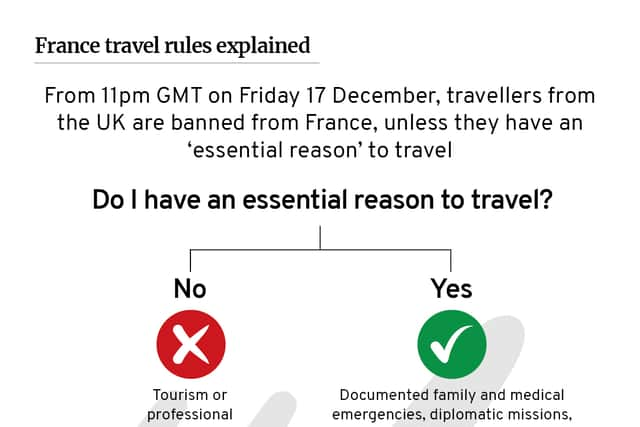France travel restrictions: Covid rules for UK visitors, entry requirements - and can I transit through France
and live on Freeview channel 276
Thousands of travellers are embarking on trips to France ahead of the introduction of a ban on UK tourists.
Cross-Channel rail operator Eurostar is urging people to avoid London St Pancras station unless they have a pre-booked ticket and a negative coronavirus test result.
Advertisement
Hide AdAdvertisement
Hide AdMost of the firm’s train services on Friday (17 December) were sold out as many people brought their Christmastravel plans forward after the new restrictions were announced on 16 December.
Ferry operators and airlines have also experienced a surge in demand.
French Prime Minister Jean Castex said tough restrictions will be enforced from 11pm UK time on Friday, including a requirement for “compelling reasons” to travel to or from the UK.
Trips for tourism or business will not be permitted. The new measures will apply to everyone, regardless of vaccination status.
Here is everything you need to know about it.
What are the new rules?
Loading....
Advertisement
Hide AdAdvertisement
Hide AdThe French government said that stronger rules were being implemented because “in the UK Government’s own words, the UK will face a ‘tidal wave’ linked to the Omicron variant in the coming days.”
In a statement on the new rules for travellers from the UK, it said: “In the face of the extremely rapid spread of the Omicron variant in the United Kingdom, the Government has chosen to reinstate compelling reasons for travel to and from the United Kingdom, and to strengthen the requirement for testing on departure and arrival.”
From 11pm UK time on Friday 17 December, the following rules will apply for travel between the United Kingdom and France.
There will be a requirement to have a compelling reason to travel to or from the United Kingdom, for both unvaccinated and vaccinated people.
Advertisement
Hide AdAdvertisement
Hide AdA list of reasons for travel can be found at this website, but they will not allow travel for tourism or business reasons.
These “compelling reasons” will not apply to French nationals and their spouses and children, who are still able to travel to France from the UK.
All travellers (including the vaccinated) must present a negative PCR or antigen test taken less than 24 hours before their departure.
Self–administered tests such as those provided free of charge by the NHS are not considered valid for the purpose of travel, and cost €49 (£42) for PCR tests and €29 (£25) for rapid antigen tests.


Do you have to quarantine?
Advertisement
Hide AdAdvertisement
Hide AdThose allowed to enter France will need to provide evidence of a negative coronavirus test taken less than 24 hours in advance, and must isolate for at least two days.
There is also an obligation for all travellers from the United Kingdom to register on a digital platform and provide the address of their stay in France prior to their trip.
This will then generate orders for all travellers, whether unvaccinated as vaccinated, to isolate for at least 48 hours in a place of their choosing.
This requirement may be lifted after that time, following proof of a negative PCR or antigen test.
Advertisement
Hide AdAdvertisement
Hide Ad“Controls will be organised to ensure the proper implementation of these measures,” said the French government.
Can I drive through France?
The measures have thrown the Christmas travel plans for hundreds of thousands of people into chaos.
People intending to travel through France to other countries can only continue with their trip if they are remaining in the international area of an airport for under 24 hours.
UK Transport Secretary Grant Shapps said hauliers will be exempt from the new rules.
Advertisement
Hide AdAdvertisement
Hide AdHe posted on Twitter: “To confirm I have liaised with my French counterpart (Jean-Baptiste Djebbari) and hauliers will remain exempt.”
What are the current Covid-related rules on entering France?
Until 11pm on Friday 17 December, all travellers aged 12 years or over travelling from outside of the European Union - which now includes the UK - to France must show proof of a negative Covid-19 test result from either a PCR or antigen test.
For travellers who are fully vaccinated, these tests must be taken no more than 48 hours before travel, while those who are not fully jabbed must have taken their test no more than 24 hours before travelling.
Non-vaccinated arrivals from the European Union must show proof of a negative Covid-19 test result taken within 24 hours before departure.
Advertisement
Hide AdAdvertisement
Hide AdMuch like the UK’s recently scrapped international travel lists, France has a colour-code system governing international travel to and from the country.
There are the usual green, amber and red categories, alongside a new ‘scarlet red’ designation introduced in response to the Omicron variant.
It is therefore recommended that you regularly check the status of the country you are travelling to or from on the French government’s website.
For the latest information on the rules and restrictions in place when travelling to and from France, head to the Government’s foreign travel advice website.
A message from the editor:
Advertisement
Hide AdAdvertisement
Hide AdThank you for reading. NationalWorld is a new national news brand, produced by a team of journalists, editors, video producers and designers who live and work across the UK. Find out more about who’s who in the team, and our editorial values. We want to start a community among our readers, so please follow us on Facebook, Twitter and Instagram, and keep the conversation going. You can also sign up to our newsletters and get a curated selection of our best reads to your inbox every day.
Comment Guidelines
National World encourages reader discussion on our stories. User feedback, insights and back-and-forth exchanges add a rich layer of context to reporting. Please review our Community Guidelines before commenting.
